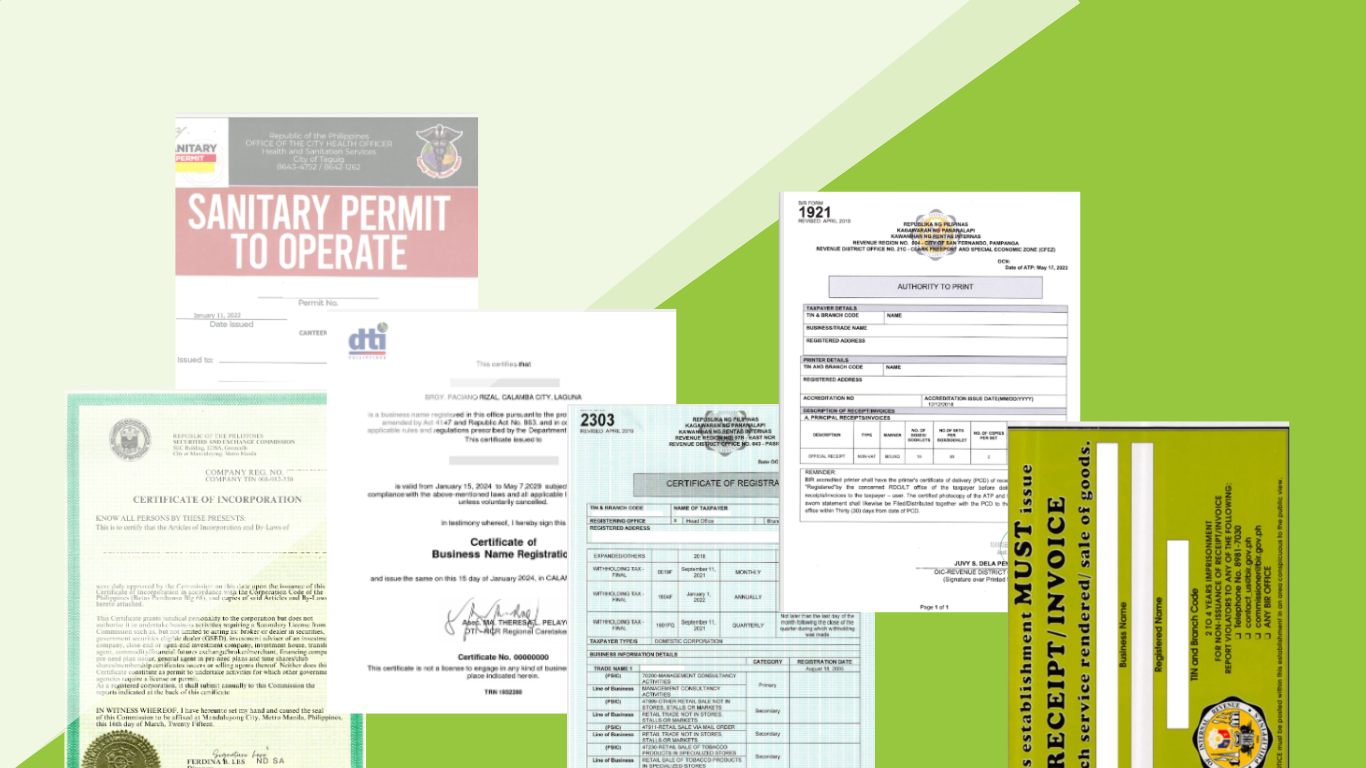Foreign business owners, expats, or foreign companies that want to engage in business or expand their business in the Philippines. In that case, you need to know the different permits and licenses essential to operate legally. The process may feel overwhelming, especially if unfamiliar with local procedures.
This article will serve as a guide on the business permits and licenses you need to acquire to do business legally in the Philippines.
Why You Need a Business Permit in the Philippines
Obtaining permits and licenses is important if you want to run a legal business in the Philippines. These ensure that your business is recognized officially by the government, can legally sign contracts or do transactions, can open an account, hire staff, and avoid any penalties, fines, or worse, business closure.
Common Permits and Licenses in the Philippines that You Need for Business Registration
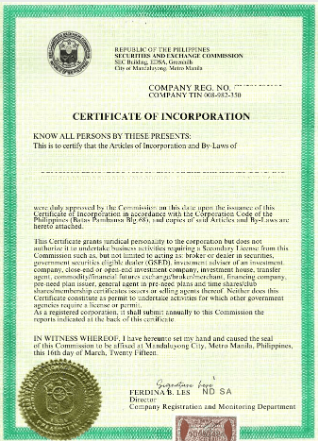
SEC Certificate of Registration
The SEC Certificate of Registration or SEC Certificate of Incorporation is a document issued by the Securities and Exchange Commission (SEC) certifying that your entity or company is legally formed or registered under the Philippines law. This is required for businesses under corporations and partnerships.
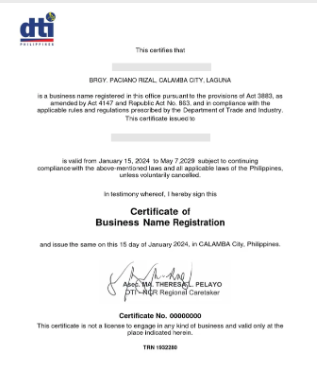
DTI Certificate of Registration
The DTI Certificate of Business Name Registration (CBNR) is a certificate issued by the Department of Trade and Industry (DTI) to sole proprietors and self-employed individuals after successful registration of a business name. Foreigners usually go through the SEC route, but those who have special visas may register here.
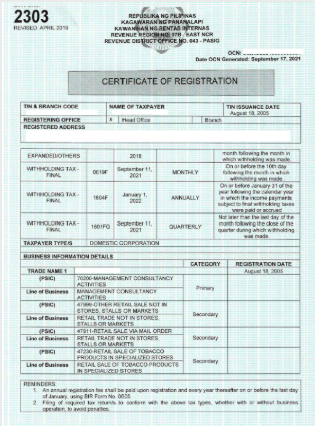
BIR Certificate of Registration
The BIR Certificate of Registration, also known as BIR Form 2303, is an official registration document issued by the Bureau of Internal Revenue (BIR) for the purpose of business tax compliance. It also allows your business to issue official receipts.
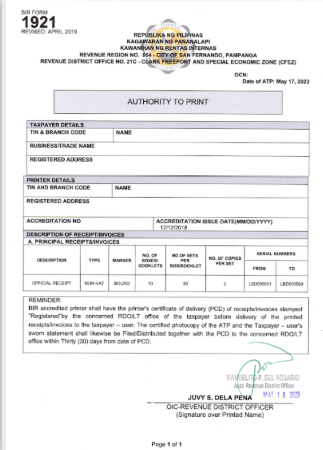
BIR Authority to Print Receipts and Invoices (ATP)
The BIR Authority to Print (ATP) is an approval document issued by the BIR that allows your business to print official receipts and invoices for transactions through an accredited printing service provider. Non-compliance can lead to tax penalties.
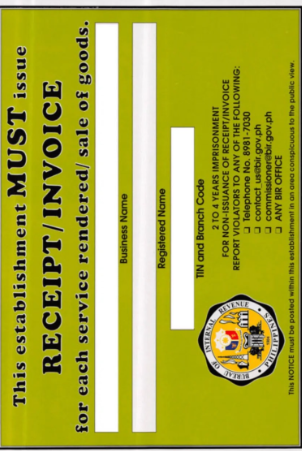
BIR Notice to Issue Receipts and Invoices (NIRI)
The BIR Notice to Issue Receipts and Invoices (NIRI) is a mandatory signage displayed at your place of business, showing that you are legally authorized by the BIR to issue receipts. This also serves as proof that your business complies with BIR tax regulations.

Business Permit or Mayor’s Permit
The Business Permit, also known as the Mayor’s Permit, is issued by the local government unit (LGU) or Municipality Business Permits and Licensing Office (BPLO), which grants permission to operate a business in that location. This government-issued license confirms that your business meets zoning, health, and safety regulations.
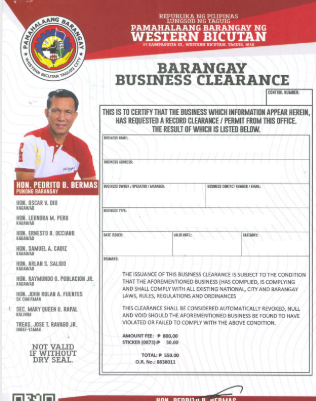
Barangay Business Permit
The Barangay Business Permit or Barangay Clearance certifies that your business can legally operate within the jurisdiction of the village or barangay. This is also a prerequisite for the application of a business permit or a mayor’s permit.
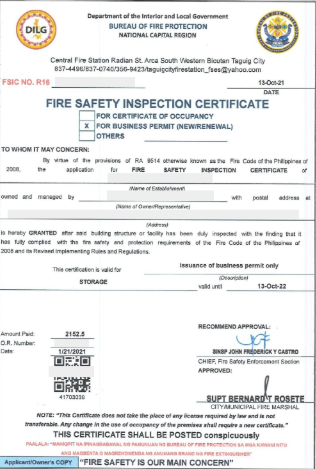
Fire Safety Inspection Certificate (FSIC)
The Fire Safety Inspection Certificate (FSIC) is issued after the inspection by the Bureau of Fire Protection (BFP) confirming your premises meet the fire safety standards of the Fire Code of the Philippines. This ensures that your workplace is safe for your staff and customers.
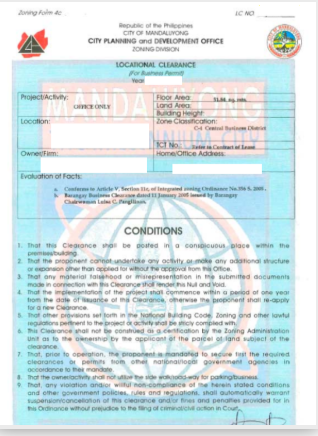
Locational and Zoning Clearance
This certificate certifies that your business complies with local land use and zoning ordinances. It is also one of the requirements when applying for a business permit or mayor’s permit. It is issued by the city government or the Municipal Planning and Development Office.
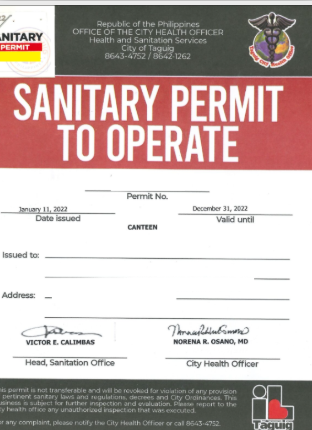
Sanitary Permit
The Sanitary Permit to Operate is a certificate issued after your business premises pass health and sanitation inspections. It is usually done by the LGU or the Municipal Health and Sanitation Department in accordance with the Sanitation Code and local regulations.
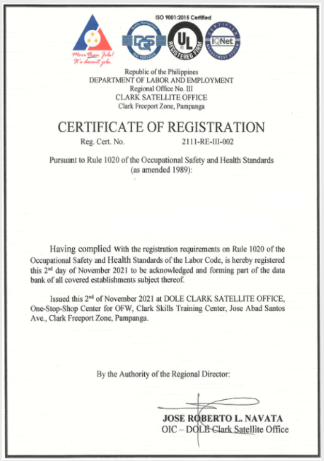
DOLE Certificate of Registration
The DOLE Certificate of Registration (COR) under DOLE Rule 1020 of the Occupational Safety and Health Standards (OSHS) is a mandatory requirement by the Department of Labor and Employment (DOLE) if you hire employees in the Philippines. It ensures compliance with Philippine labor laws.
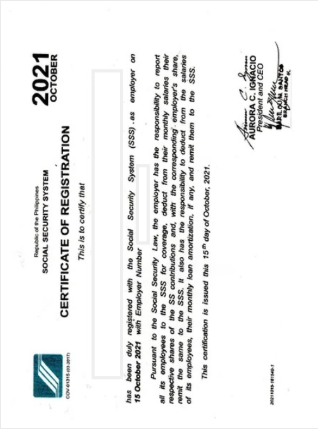
SSS Certificate of Registration
The SSS Certificate of Registration (COR) is a document that serves as a proof taht your business is registered as an employer under the Republic Act 11199, or the Social Security Act of 2018. This ensures your employees have social security coverage.
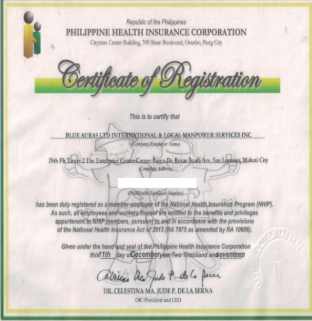
PhilHealth Certificate of Registration
This certificate mandates the provision of health insurance coverage by enrolling your employees and remitting contributions under the R.A. 11223 or the Universal Health Care (UHC) Act. This is issued by the Philippine Health Insurance Corporation (PHIC).
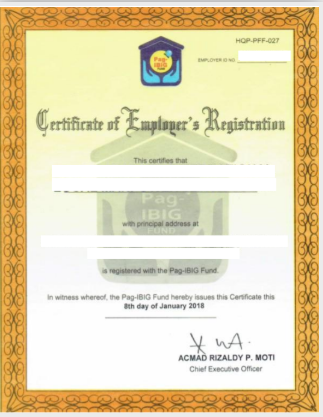
Pag-IBIG Fund Certificate of Employer’s Registration
This certificate is issued to employers by the the Home Development Mutual Fund (HDMF) under R.A. 9679, also known as the Pag-IBIG Fund Law, which requires employers to register and employees to contribute to housing and savings benefits.
The Role of Virtual Office When Applying for a Business Permit and Licenses
Starting a business in a new country is exciting, but let’s be honest, it can also get overwhelming, especially when you’re asked for a local business address before you even fully get started. That’s where a virtual office like Akasya Virtual Office comes in, and honestly, it’s one of the smartest moves you can make if you’re not ready to rent a physical office space yet.
A Virtual Office gives you a legitimate business address you can use when applying for permits like the Barangay Business Permit, Mayor’s Permit, and even your BIR registration. It saves you from the hassle and big costs of renting an actual office when all you really need at the start is to get your paperwork done.
Additionally, virtual office providers handle your official mail for you, so you won’t have to worry about missing any important documents or government notices. It’s a practical, budget-friendly solution that lets you meet the legal requirements while you focus on building your business at your own pace.
Final Thoughts
Starting a business in the Philippines as a foreigner or expat may seem like a lot of paperwork, but once you break it down, it’s simply about securing the right permits, licenses, and registrations. Each document plays an essential role in making your business legitimate, tax-compliant, and ready to grow. And if you don’t have a physical office yet, Akasya Virtual Office can be your best ally, giving you a legal business address so you can complete these requirements without the heavy upfront costs.
With the right guidance and local support, you can focus on what matters most: building your business and tapping into the Philippine market’s full potential.

